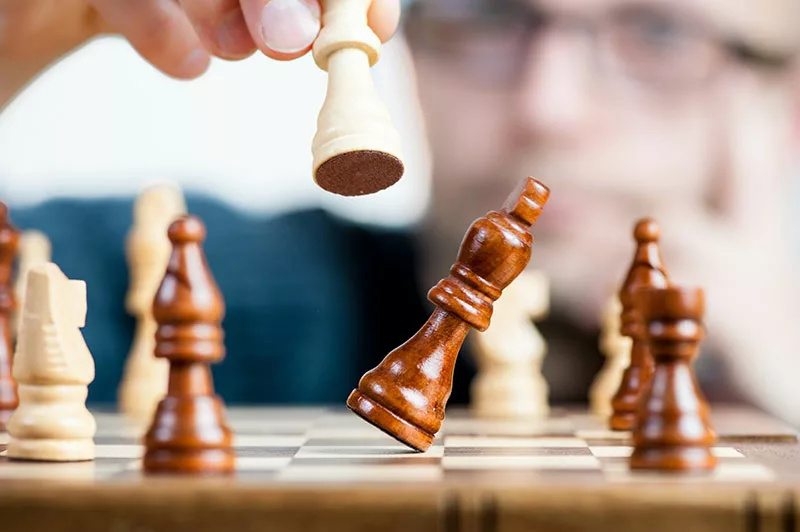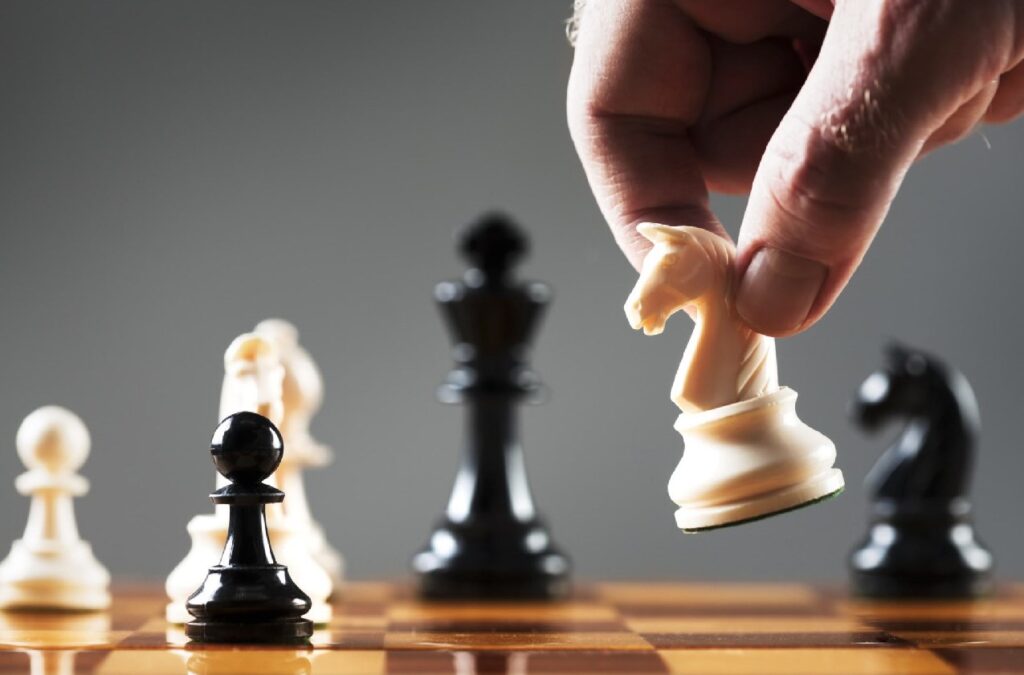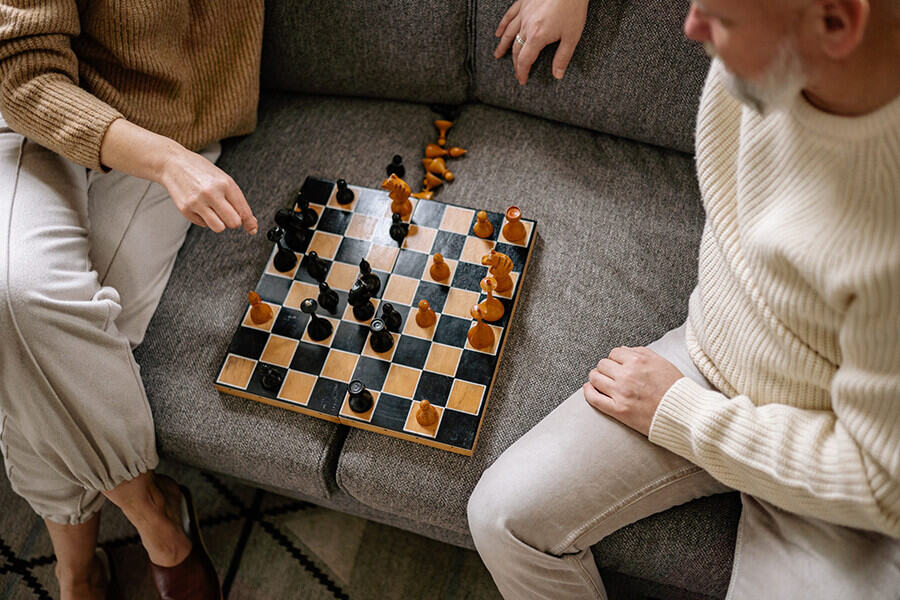Chess is more than just a game. It’s a powerful mental workout that stretches your mind and enhances your ability to solve problems. Over time, as you play and practice chess, the skills you develop on the board start to influence how you think off the board too. The beauty of chess is that it teaches you how to approach complex problems step by step, using patience, foresight, and strategic thinking. Whether you’re a beginner or a seasoned player, the game offers lifelong benefits, particularly in the realm of problem-solving.
How Chess Enhances Problem-Solving Skills
Thinking Several Moves Ahead
One of the main aspects of chess that directly improves problem-solving is the need to think ahead. In chess, you can’t just react to what’s happening in the moment.
You need to plan several moves in advance, anticipating your opponent’s reactions and adjusting your strategy accordingly. This habit of thinking ahead is crucial for solving problems in everyday life.
For example, let’s say you’re working on a project at school or work. Instead of just focusing on the first step, you need to think about how each action you take will affect the outcome down the line.
Chess teaches you to consider different outcomes before committing to a decision, helping you make more thoughtful, informed choices. The more you practice this kind of thinking in chess, the better you become at applying it to real-world problems.
Breaking Down Complex Problems
In a chess game, you’re constantly faced with complex situations. But instead of trying to tackle the entire board at once, good players break the problem down into smaller, more manageable pieces.
They focus on specific areas of the board, piece interactions, or tactical patterns. By breaking down the complexity into smaller chunks, it becomes easier to find solutions.
This ability to break down large problems into smaller steps is a key problem-solving skill that extends far beyond the chessboard. In life, whether you’re solving a mathematical problem, working on a creative project, or handling personal challenges, the ability to simplify complexity into manageable parts makes it easier to navigate difficult situations.
Evaluating Different Options
Every move in chess comes with a range of possible choices, each with its own risks and rewards. As you play more games, you learn how to carefully evaluate these options.
Should you attack aggressively, defend a key piece, or prepare for a long-term strategy? Each decision requires careful thought and analysis.
This practice in chess directly improves your decision-making in real life. By learning to weigh different options and consider their potential outcomes, you become more adept at evaluating solutions to any problem you face.
Chess teaches you to think critically before acting, helping you avoid rushed decisions that could lead to mistakes.
Patience and Discipline in Problem-Solving
Waiting for the Right Moment
Chess teaches you the value of patience. Sometimes, the best move isn’t the obvious one, and waiting for the right opportunity can make all the difference.
You might want to attack, but you know it’s better to wait until your pieces are well-positioned. This patience helps build discipline, which is crucial in problem-solving.
In real life, many problems don’t have immediate solutions. You often need to wait, gather more information, or let things play out before making a decision.
Chess teaches you how to be patient and disciplined, skills that are necessary when facing long-term challenges where rushing in too early could create bigger problems.
Staying Focused
Chess also improves your ability to stay focused over extended periods.
A single chess game can last for hours, requiring concentration from start to finish. If you lose focus, you can miss an important move or overlook a potential threat.
This ability to maintain attention over time helps you in solving complex problems that require long-term focus and careful thought.
In many problem-solving situations—whether it’s a challenging project or a complicated personal issue—staying focused is key to finding effective solutions. Chess trains your brain to stay on task, helping you remain engaged and thoughtful until the problem is solved.
Creative Thinking in Chess and Life
Finding Unique Solutions
While chess is a game of logic, it also requires creativity. Sometimes, traditional strategies don’t work, and you need to come up with new, creative ways to solve a problem.
Maybe that means sacrificing a piece to gain a better position, or finding a hidden tactic your opponent didn’t see.
This creativity is essential in real-world problem-solving. When the obvious solution doesn’t work, thinking outside the box can lead to breakthroughs.
Chess teaches you that creativity and logic often go hand in hand, allowing you to find solutions that others may not see.
Improvising Under Pressure
In chess, unexpected situations often arise. Your opponent might make a move that throws off your plan, forcing you to think on your feet and adapt.
This teaches you how to handle pressure and adjust quickly when things don’t go as expected.
In life, problems rarely unfold exactly as planned. The ability to improvise and come up with creative solutions on the fly is invaluable.
Chess helps you develop this skill by teaching you to adapt your strategy and keep calm under pressure, no matter how complicated the situation becomes.
Building Confidence in Decision-Making
Trusting Your Judgement
Chess is a game of decision-making. Each move is a choice, and over time, players learn to trust their judgment.
Whether it’s deciding to attack, defend, or sacrifice a piece, you learn to rely on your analysis and instincts. This confidence in your decision-making grows the more you play.
In life, this translates to becoming more assured when faced with tough decisions. You gain the confidence to trust your choices, knowing that you’ve considered all the options, weighed the risks, and made the best possible move.
Chess helps you build this mental strength, making you more decisive and self-assured in everyday problem-solving.
Learning from Mistakes
No chess player is perfect, and mistakes are part of the game. But each mistake offers a valuable lesson. After every loss, players often review their games to figure out where they went wrong.
This reflective process helps you learn and grow, improving your decision-making for future games.
In real life, mistakes are inevitable, especially when solving complex problems. Chess teaches you not to fear failure but to see it as an opportunity to improve. By reflecting on your mistakes, you learn to make better decisions the next time you face a similar challenge.
Chess Develops Strategic Thinking

Balancing Short-Term and Long-Term Goals
In chess, you must constantly balance immediate moves with your long-term strategy. A good player doesn’t just think about the next move—they think about how it will affect their position several moves later.
This long-term planning is essential for success in chess and in life.
When solving real-life problems, it’s easy to focus on short-term gains without considering the long-term consequences. Chess teaches you to always keep the bigger picture in mind, ensuring that your decisions today set you up for success in the future.
Adapting Strategy
No matter how well you plan in chess, your opponent might surprise you with an unexpected move.
This forces you to adapt your strategy quickly. The ability to shift your approach while still working toward your overall goal is key to solving problems both on the board and in real life.
In life, unexpected challenges often require you to change your strategy. Chess trains your brain to stay flexible, adjust plans as needed, and keep moving forward, even when things don’t go as expected.
Enhancing Memory and Recall
Recognizing Patterns
As you play more chess, you begin to recognize patterns. Certain moves and strategies start to become familiar. Your brain automatically recalls tactics you’ve seen before, helping you react faster and more effectively.
This ability to recognize and recall patterns helps in everyday problem-solving. Whether it’s remembering how you tackled a similar issue in the past or spotting trends in a project, your memory becomes sharper through chess, making it easier to retrieve information when you need it.
Strengthening Mental Recall
Chess requires players to remember many things: opening sequences, tactical ideas, and previous games. This constant mental recall improves memory over time.
You train your brain to hold onto useful information and apply it when necessary.
This improvement in mental recall helps when solving complex problems outside of chess. You’re able to quickly remember important facts or solutions you’ve used in the past, allowing you to address new problems with confidence and efficiency.
Building Emotional Resilience
Managing Frustration
Chess can be an emotional game. Whether you lose a key piece or find yourself in a difficult position, frustration is part of the process.
However, the game teaches you to manage those emotions, stay calm, and think clearly under pressure.
This emotional resilience is valuable when solving real-life problems. When things don’t go your way, chess teaches you to keep your cool and think rationally, instead of letting frustration cloud your judgment.
This ability to stay composed under stress makes you a better problem-solver in high-pressure situations.
Bouncing Back from Setbacks
Losses in chess are common, but they are also learning opportunities. Each game, whether won or lost, helps players develop resilience.
After a setback, you analyze what went wrong and come back stronger. This mindset of continual improvement helps build the strength to face challenges head-on.
In life, setbacks are inevitable. Chess teaches you not to give up when things get tough but to learn from your mistakes and keep pushing forward.
This resilience makes you better equipped to handle obstacles and bounce back from failure.
Developing Critical Thinking
Evaluating Multiple Solutions
In chess, there is rarely only one possible move. For each position, there are multiple options to consider, each with its own set of consequences.
Players must evaluate each move, thinking about what’s best not just for the present but for future moves as well. This evaluation process builds critical thinking skills.
In problem-solving, the ability to weigh multiple solutions before choosing the best one is key.
Chess teaches you to think critically about your choices, consider different approaches, and select the one that leads to the best long-term outcome. This kind of decision-making is valuable in real-life situations, whether you’re dealing with work challenges, personal issues, or complex tasks.

Analyzing Cause and Effect
Every action in chess has an immediate reaction. If you move a piece, it affects the entire board and influences your opponent’s strategy.
Players constantly analyze the cause-and-effect relationship of their moves, which helps them anticipate what might happen next.
This ability to foresee the consequences of your actions is essential for solving real-world problems.
Chess teaches you to think about how your decisions will impact the future, encouraging you to choose wisely and avoid impulsive actions that could lead to negative results.
Improving Focus and Attention to Detail

Staying Present
Chess requires full concentration. Even a slight lapse in focus can lead to a missed opportunity or a costly mistake.
Players learn to stay present, keeping their attention on the game and considering every detail before making a move.
This focus is invaluable when solving problems, especially complex ones that require sustained mental effort.
Whether you’re working on a difficult task at school or tackling a project at work, the focus and attention you build through chess help you stay engaged until the problem is solved.
Spotting Small Details
In chess, small details matter. A seemingly minor move can have a big impact on the overall game.
Players learn to look closely at the board, scanning for weaknesses or opportunities that may not be immediately obvious. This skill transfers well to solving problems where noticing small details can be the key to finding a solution.
In real life, spotting these details—whether in a business report, a personal situation, or a creative project—can help you avoid mistakes or uncover hidden opportunities.
Chess teaches you the value of being thorough and meticulous, improving your ability to solve problems with precision.
Fostering Patience and Long-Term Thinking
Delayed Gratification
Chess teaches you that sometimes the best move isn’t the one that brings immediate reward. You may need to wait several moves for your strategy to unfold, exercising patience and self-control.
This concept of delayed gratification helps players understand that long-term success often comes from waiting for the right moment, rather than rushing to achieve quick results.
In problem-solving, especially in complex or long-term situations, patience is essential. You may need to gather more information, test different approaches, or wait for the best opportunity to act.
Chess shows that a well-thought-out plan can take time to develop, and the willingness to be patient often leads to better results.
Planning for the Future
Chess players don’t just think about their next move; they think several moves ahead. This kind of long-term thinking is vital in both chess and life.
Planning for the future ensures that your actions today contribute to success down the road. The more you play chess, the better you become at seeing the bigger picture and planning accordingly.
In real-world problem-solving, this ability to think ahead helps you avoid short-sighted decisions.
Whether you’re managing a project, setting personal goals, or handling complex tasks, the habit of long-term thinking developed through chess helps you stay focused on the end goal and build solutions that stand the test of time.
Chess Teaches Risk Management

Weighing Risks and Rewards
Every move in chess involves a certain level of risk. Do you go for an aggressive attack and risk losing material? Or do you play it safe and try to strengthen your position?
Chess teaches players how to evaluate risks and rewards, helping them determine when it’s worth taking a chance and when it’s better to be cautious.
This skill is directly transferable to solving problems in life. Many decisions involve some degree of risk, whether financial, personal, or professional.
Chess trains your mind to carefully weigh the potential benefits against the possible downsides, helping you make more calculated, informed decisions.
Managing Uncertainty
Chess is a game filled with uncertainty. You don’t know exactly what your opponent will do, but you can make educated guesses based on their previous moves.
Players learn to manage this uncertainty by preparing for various scenarios and being ready to adapt their strategy when needed.
In life, uncertainty is unavoidable. Whether you’re navigating career decisions, personal relationships, or unexpected challenges, learning how to manage uncertainty is critical.
Chess prepares you to face the unknown with confidence, helping you stay flexible and open to change while still pursuing your goals.
Chess is a Lifelong Mental Workout
Chess continuously sharpens your brain. Whether you play casually or competitively, the game pushes you to think critically, solve problems, and strategize.
Over time, this mental exercise strengthens your problem-solving abilities, giving you an edge in both personal and professional life.
Chess Builds Emotional Resilience
The game teaches you how to handle frustration and setbacks. Losing pieces, facing difficult positions, and even losing games are part of the journey.

Chess trains you to bounce back, stay calm, and keep working toward a solution. This emotional resilience is key to navigating real-life challenges.
Chess Encourages Forward Thinking
Every move in chess has long-term consequences. Players must always think several steps ahead, balancing short-term tactics with long-term goals.
This habit of thinking ahead prepares you to plan better in everyday life, from personal goals to professional projects.
Chess Fosters Creativity in Problem-Solving
While chess is a game of logic, creativity often plays a vital role. Finding unexpected moves and unique strategies helps you outwit opponents, even when the situation looks tough.
This blend of logic and creativity makes you more adaptable and innovative in approaching real-world problems.
Chess Sharpens Decision-Making Skills
In chess, every move is a decision. The more you play, the better you get at evaluating options, understanding risks, and making confident choices.
This ability to make clear, informed decisions is invaluable when solving problems both big and small.
Chess Teaches the Value of Patience
Winning in chess often requires waiting for the right moment to strike. Learning to be patient, to hold back until the timing is perfect, is a key lesson that translates directly into life.
Whether solving a complex issue or working toward a long-term goal, patience is often the difference between success and failure.
Wrapping it up
In short, chess is a powerful tool for improving long-term problem-solving skills. It enhances critical thinking, patience, creativity, and emotional resilience, while teaching players how to manage risk and think several steps ahead.
The mental exercises and strategic thinking developed through chess have real-world applications that go far beyond the chessboard, helping you solve complex problems with confidence and clarity.
At Global School of Chess, we believe in using chess to unlock your full problem-solving potential. Ready to sharpen your mind?
Visit us at Global School of Chess and start your journey today!
READ NEXT:

